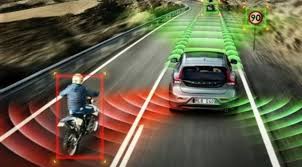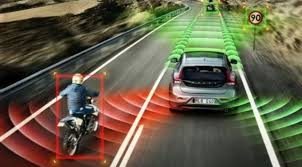
Competition among rival camps of technology and auto companies over what equipment will be on board cars of the future has intensified after Tesla Motors Inc's decision to equip all of its vehicles with self-driving hardware.
Lidar is the laser imaging technology most other companies pursuing self-driving cars are using to generate precise pictures of the environment around their vehicles but Tesla's self-driving system will rely on cameras and radar sensors -- but not lidar.
Earlier Tesla models equipped with Autopilot, a semi-automated system designed to assist with driving but not replace the driver, were equipped with technology from Mobileye, the Israeli-based supplier of computer vision chips and software. But Tesla is not u Mobileye technology this time around.
Following a fatal crash in May in which the driver of a Tesla Model S was killed after hitting a truck while driving on Autopilot, Tesla Chief Executive Elon Musk and Mobileye this summer engaged in a public dispute over the safety of Autopilot.
"Selling a vehicle with the latest and greatest hardware, but an unproven self-driving software package is a risky strategy," said Barclays analyst Brian Johnson.
While Tesla shares fell 2.2 percent to $199.10, shares of Mobileye rose 2.6 percent to $38.27 on THirsday indicating that investors appeared to be betting on the latter.
Mobileye has formed alliances to pursue self-driving vehicle systems with German automaker BMW AG, U.S. supplier Delphi and chip maker Intel and supplies two dozen other automakers and suppliers.
"As we move to a higher level of autonomy in vehicles, you're going to want to have more redundancy," which radar and lidar can provide, Dan Galves, senior vice president at vision safety system maker Mobileye, said in an interview. "The more sensors, the better," Galves said.
Nvidia, the Silicon Valley chipmaker that will provide processors for the new Tesla system, is the winner in the fallout from the Tesla-Mobileye dispute. Nvidia shares rose another 1.9 percent on Thursday to close at $67.73 and have more than doubled in the past year.
While most major manufacturers and suppliers are working furiously on different technology suites -- including cameras, radar and lidar -- to enable vehicles to drive themselves, no automaker, including Tesla, currently offers a fully self-driving car.
A combination of lidar, radar and cameras are used in Google's self-driving cars. Compensation for the limitations of each type of sensor is made by the multi-sensor approach, the company has said.
While ice and snow can block a camera's view, they do not perform well in the dark or in bright light. Although less effective in fog, rain and snow, Lidar can create a 360 degree view of the car's surroundings.
One of the obstacles to putting self-driving cars in consumers' hands is the high cost of lidar, currently about $8,000. But the cost is expected to fall to $25-$100 in the coming years as it is rapidly declining.
Ford Motor Co does not plan to put a fully self-driving vehicle into production for ride-sharing fleets until 2021 and for individual consumers until 2025 or later. It is an investor in lidar manufacturer Velodyne.
Wide spread use of Level 5 vehicles -- those capable of fully automated operation without humans in all situations, would not be possible until another 10-15 years, Toyota Motor Corp has said.
(Source:www.reuters.com)
Lidar is the laser imaging technology most other companies pursuing self-driving cars are using to generate precise pictures of the environment around their vehicles but Tesla's self-driving system will rely on cameras and radar sensors -- but not lidar.
Earlier Tesla models equipped with Autopilot, a semi-automated system designed to assist with driving but not replace the driver, were equipped with technology from Mobileye, the Israeli-based supplier of computer vision chips and software. But Tesla is not u Mobileye technology this time around.
Following a fatal crash in May in which the driver of a Tesla Model S was killed after hitting a truck while driving on Autopilot, Tesla Chief Executive Elon Musk and Mobileye this summer engaged in a public dispute over the safety of Autopilot.
"Selling a vehicle with the latest and greatest hardware, but an unproven self-driving software package is a risky strategy," said Barclays analyst Brian Johnson.
While Tesla shares fell 2.2 percent to $199.10, shares of Mobileye rose 2.6 percent to $38.27 on THirsday indicating that investors appeared to be betting on the latter.
Mobileye has formed alliances to pursue self-driving vehicle systems with German automaker BMW AG, U.S. supplier Delphi and chip maker Intel and supplies two dozen other automakers and suppliers.
"As we move to a higher level of autonomy in vehicles, you're going to want to have more redundancy," which radar and lidar can provide, Dan Galves, senior vice president at vision safety system maker Mobileye, said in an interview. "The more sensors, the better," Galves said.
Nvidia, the Silicon Valley chipmaker that will provide processors for the new Tesla system, is the winner in the fallout from the Tesla-Mobileye dispute. Nvidia shares rose another 1.9 percent on Thursday to close at $67.73 and have more than doubled in the past year.
While most major manufacturers and suppliers are working furiously on different technology suites -- including cameras, radar and lidar -- to enable vehicles to drive themselves, no automaker, including Tesla, currently offers a fully self-driving car.
A combination of lidar, radar and cameras are used in Google's self-driving cars. Compensation for the limitations of each type of sensor is made by the multi-sensor approach, the company has said.
While ice and snow can block a camera's view, they do not perform well in the dark or in bright light. Although less effective in fog, rain and snow, Lidar can create a 360 degree view of the car's surroundings.
One of the obstacles to putting self-driving cars in consumers' hands is the high cost of lidar, currently about $8,000. But the cost is expected to fall to $25-$100 in the coming years as it is rapidly declining.
Ford Motor Co does not plan to put a fully self-driving vehicle into production for ride-sharing fleets until 2021 and for individual consumers until 2025 or later. It is an investor in lidar manufacturer Velodyne.
Wide spread use of Level 5 vehicles -- those capable of fully automated operation without humans in all situations, would not be possible until another 10-15 years, Toyota Motor Corp has said.
(Source:www.reuters.com)














